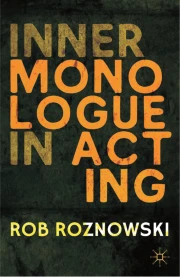
This is a preview of subscription content, log in via an institution to check access.
Softcover Book EUR 52.74
Price includes VAT (France)Hardcover Book EUR 52.74
Price includes VAT (France)Tax calculation will be finalised at checkout
What should an actor be thinking onstage? This overlooked, important question is the crux of this new book that combines psychological theory, numerous practical exercises, and a thorough and wide-reaching examination of inner monologue in various forms including film, musical theatre, and comedy.
"This is a great book; it will be useful in the classroom and in production practice. Summing Up: Highly recommended. Readers at all levels." - CHOICE
"Through the examination of self as a person, self as an actor, and self as a character, each chapter aims to ignite the actor's inner voice and imagination in a manner that fills them up and carbonates them. The detailed examination of the inner monologue that lives in the transitions between lines and the silences between characters is ultimately a life-long lesson for actors of all ages, making this book appropriate for even the most seasoned of actors." - Kevin Connell, Professor of Theatre Arts, Marymount Manhattan College, USA
"I guarantee that actors, acting teachers, and directors will read this book and want to immediately apply the principles and exercises outlined therein. It is certainly an important concept in acting and all too often not explained well in acting texts. I am positive I will retain it as an important teaching tool in all levels of acting and auditioning." - Deborah Jordan, Assistant Professor of Theatre, Program Head, Acting & Directing, Jacksonville University, Florida, USA
Rob Roznowski is Associate Professor and Head of Acting and Directing in the Department of Theatre at Michigan State University, USA.